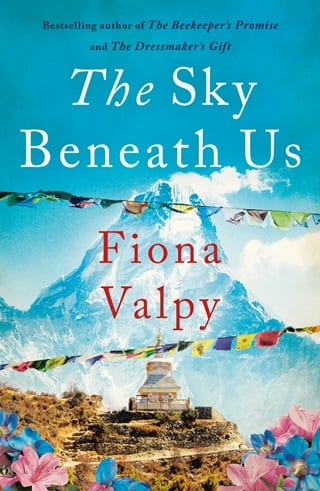Violet’s Journal
S ATURDAY , 28 TH J ULY , 1956
Today is Themi’s twenty-fifth birthday. She’s so grown up, my beautiful girl.
We’ve had a party and now she’s finishing clearing everything away whilst I sit and write this, reflecting on the life we’ve made here. There’s no doubt, things have changed a lot since my arrival all those years ago.
These days, the money the men earn from guiding expeditions to Everest and the other high peaks has had the power to change lives. It means the people of Phortse can afford to buy the materials to put proper roofs on their houses, instead of making do with slates and stones clawed from the mountainsides around them, and to purchase cast-iron stoves to heat their homes and cook their food. We can pay porters to bring food to the village too now – eggs and fruit and vegetables to nourish our children and prevent the malnutrition that used to bend their bones, crippling them, and made them susceptible to diseases.
Sir Edmund Hillary has expressed his gratitude to the Sherpas who helped him to the top of Everest. He’s provided funding so that a school can be built in the village here, and the community is going to club together to employ a teacher so our children can have a proper education.
Standing on the heads of the mountain deities, though, has brought bad karma , just as the women foresaw. Climbing those peaks is never something the Sherpas would have done, were it not for the opportunity to try to improve life for their children. And so, whilst the Sherpa men take the risks, leading the climbers and going on ahead to find routes, fix ropes and set ladders across the gaping crevasses in the glaciers tumbling down the mountainsides, the women remain at home and send prayers to the gods to try to make amends for the dishonour the men are bringing upon their communities.
Sometimes the prayers seem to work. The men return home with cash in their pockets, lighting incense and making offerings to the gods to apologise for their transgressions. But other times the gods cannot be appeased. Men have been killed as avalanches thunder down on them, or as those hungry crevasses swallow them whole. Sometimes they lose their lives in accidents whilst trying to help and protect the less experienced climbers who now come to Nepal thinking they can conquer the mountains, only to find that the mountains have little regard for the ambitions of puny humans.
I’ve been doing my bit as well. I quickly realised that, for the community of Phortse, the most valuable thing I had to offer was my language. And so I run English classes in the newly built school, teaching the children and their mothers during the day, and in the evenings giving the men the vocabulary they need to be able to communicate, to lead climbs and instruct westerners how to keep themselves safe as they attempt to survive in the high-altitude death zone. I’m paid in cash from the guides as well as in foodstuffs, and Themi and I get by quite well.
I still spend my spare time in the Valley of Flowers. For now, it remains safely hidden from the groups of trekkers, who mostly stick to the main route to Everest Base Camp and bypass this forgotten corner. But past history has taught us how progress comes at a cost – a price paid all too often by the natural world around us. And so it seems all the more important to continue cataloguing what we have here. It may not be much, but I think of it as my legacy, and Callum’s as well. He’s still my constant companion as I uncover and document the valley’s riches. Some days I imagine I can hear the long-ago echoes of a whistled tune, carried on the wind as it swirls down from the mountain peaks.
From indoors, I hear my daughter laugh and it sounds as melodious as the chiming of yak bells on the hill. Tshering is there with her. He stayed behind when the others left and is wielding a tea towel as she passes him the dripping plates. It’s been more and more noticeable that he spends every minute he can spare, paying her visits or going for walks with her to collect juniper twigs and bamboo when he’s not away guiding. His face lights up at the sight of her, the way Callum’s would light up when the two of us were together. Although Themi and I are still outsiders, it seems the rules could be bent a little to allow them to marry despite the fact she’s not a Sherpa. It would mean foregoing the three-day celebrations of a traditional marriage ceremony, but Tshering’s mother has already intimated to me that they wouldn’t mind that. Everyone loves Themi. The villagers consider her one of their own.
They’ve finished the chores now and Themi has just popped her head through the window to say she and Tshering are going to walk up the hill a little way to watch the sunset. I smile and nod, and remember a lily her father once showed me, back in the Herbarium in Edinburgh all those lifetimes ago. I painted its portrait, tinting the petals coral pink and gold, the colours of the clouds crowning Khumbila this evening.
It feels as though Callum is bestowing his blessing on them as they walk hand in hand along the path above me, dreaming, perhaps, of a legacy of their own.
 Fullepub
Fullepub 



